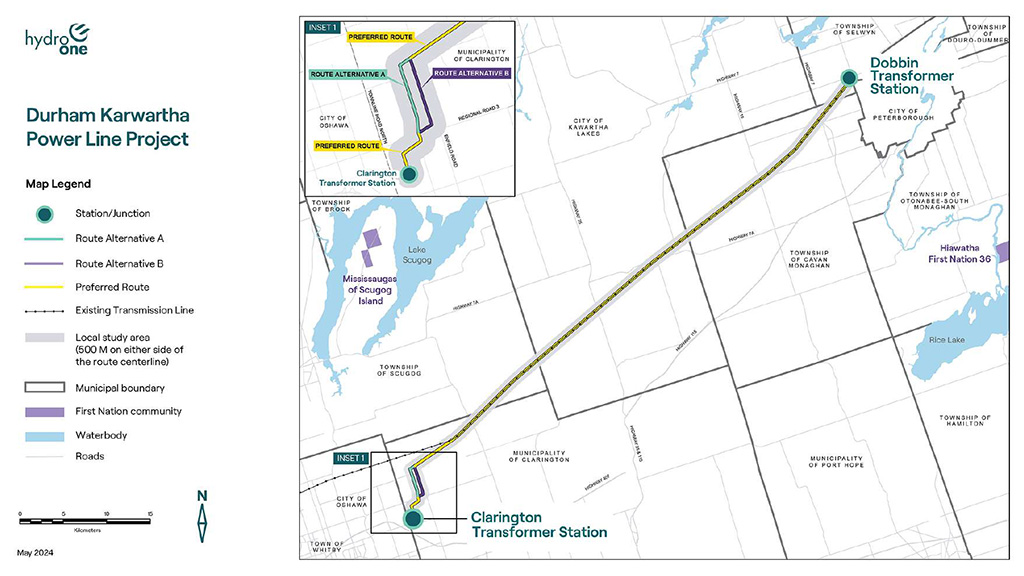Once completed, a new transmission line being constructed is expected to increase power capacity and resiliency in eastern Ontario and the surrounding areas.
Hydro One is proposing to construct the Durham Kawartha Power Line, a new double circuit 230 kilovolt transmission line between the Clarington transformer station in Oshawa, Ont. and Dobbin transformer station in Peterborough.
The power line will accommodate the 20-year long-term growth for Peterborough to Quinte West and Ottawa, bringing over 400 megawatts of power to the area. The project is currently in the planning stages.
Routes for power line being planned
Hydro One conducted preliminary planning to identify route alternatives, mapping out local features and constraints such as waterbodies, residential areas, environmentally significant areas and also looked for opportunities to parallel linear infrastructure.
Based on that information, Hydro One is studying two route alternatives for a three-kilometre section of the project.
“It’s approximately 65 kilometres or so in length and that will be determined by the final routing for the transmission line,” explained Hydro One’s vice-president of strategic projects and partnerships, Sonny Karunakaran.
“We look to try and parallel existing linear infrastructure and other transmission lines that are up there to obviously try and mitigate and minimize disturbances and impacts associated with this new project.”
Formerly known as the Greater Toronto Area East Line, the project will support the region’s economic development and future growth, Hydro One states.
Open houses were held recently to gather feedback and input will be taken into consideration.
“It’s very early days in the project but under the notice of commencement we have identified the locations of the stations through a mapping and constraints assessment,” said Karunakaran.
“Through a mapping and constraints assessment, we have identified routes for the actual transmission line itself. What we are looking to do is to engage with the public to share information with them around the line routing specifically, what some of the considerations are that we would typically provide when doing assessments under the Environmental Assessment for a project of this nature.”
Environmental Assessment process underway
Hydro One will complete a Class Environmental Assessment (EA), which will follow the “Class Environmental Assessment for Transmission Facilities,” in accordance with the Ontario Environmental Assessment Act.
Field studies and research to support the Class EA are underway.
“We’ve been working on the project for a number of months now and starting to put more scope definition around it,” said Karunakaran, adding they will be using a specific type of delivery model, “which is called an Early Contractor Involvement Delivery Model. We’re in the process of going through and actually being able to procure the services of ECP (engineering, procurement and construction) contractors to be able to work with us during the development phase. Then as we sort of progress over the next couple of years to finalize development and move forward in construction there will be a selection of one of those contractors to actually build the project.”
Findings from the Class EA as well as input from community members will be used to determine the preferred route, which is expected to be announced this fall.
“It’s an opportunity for them to find out information and speak to members of our project team but for us to also learn from them as well,” he added.
Construction is anticipated to begin in 2027 and be completed by 2029, following approval from the Ontario Energy Board (under Section 92 (Leave to Construct) of the Ontario Energy Board Act) and the completion of the Class EA process.
Follow the author on X/Twitter @DCN_Angela.

